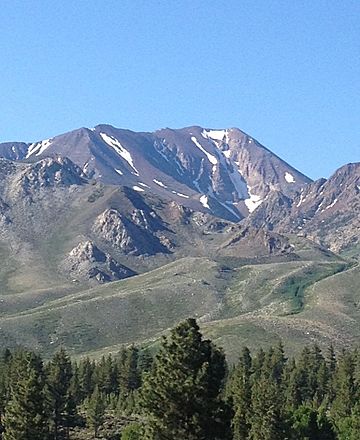Bloody Mountain (California) facts for kids
Quick facts for kids Bloody Mountain |
|
|---|---|

Bloody Mountain, Mammoth Lakes, CA, US. Shot from the North (Highway 203)
|
|
| Highest point | |
| Elevation | 12,558 ft (3,828 m) NAVD 88 |
| Prominence | 1,234 ft (376 m) |
| Geography | |
| Location | Mono County, California, U.S |
| Parent range | Sierra Nevada |
| Topo map | USGS Bloody Mountain |
| Climbing | |
| First ascent | July 3, 1928 by Norman Clyde |
Bloody Mountain is a tall and striking peak in the Sierra Nevada mountain range. It stands proudly in eastern California, about one mile southeast of the town of Mammoth Lakes. This mountain is part of Mono County in the southwestern United States.
Contents
Exploring Bloody Mountain
Bloody Mountain reaches an impressive height of 12,558 feet (3,828 meters) above sea level. It is a noticeable landmark in the Sierra Nevada range. The mountain is known for its rugged beauty and is a popular spot for outdoor adventures.
First Climbers and Adventures
The first recorded climb to the very top of Bloody Mountain happened on July 3, 1928. A famous American mountaineer named Norman Clyde was the first to achieve this feat. He was known for his many first ascents in the Sierra Nevada mountains. Today, hikers and climbers still enjoy exploring its trails and challenging peaks.
Where is Bloody Mountain?
Bloody Mountain is located in a beautiful part of California. It is close to the popular resort town of Mammoth Lakes, which is famous for skiing and other outdoor activities. The mountain is also part of the John Muir Wilderness, a protected area known for its stunning natural landscapes.
The Story Behind the Name
The name "Bloody Mountain" might sound a bit mysterious, and its exact origin is not fully clear. There are a couple of interesting ideas about how it got its unique name.
Red Rocks or a Skirmish?
One idea is that the mountain was named for the color of its rocks. Some people believe that parts of the mountain appear reddish, especially at certain times of the day or year, making it look "bloody." Another story suggests a different origin. It is said that the name comes from a historical event in 1871. This story tells of a "bloody skirmish" or fight that took place between a sheriff and some escaped convicts in the area. Both stories are part of the mountain's local history and add to its intriguing character.

